Netflix’s The Crown press conference with Claire Foy, Matt Smith, Vanessa Kirby, Jared Harris, Peter Morgan and Stephen Daldry.
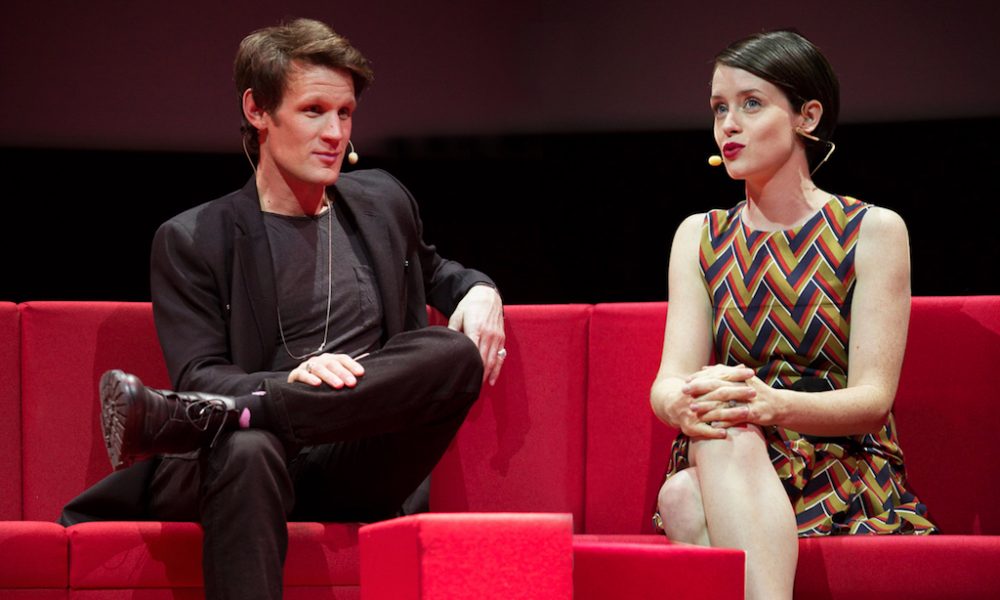
The Crown, an epic series telling the tale of Elizabeth II’s rise to the throne, is soon to be released on Netflix. We caught up with director Stephen Daldry, writer Peter Morgan, and actors Claire Foy, Matt Smith, Vanessa Kirby and Jared Harris at the series’ press conference in London. They talked about the changing nature of TV, what it took to honestly portray such famous figures and the pros and cons of the ornate costumes in the show.
Peter, could you take us through the gestation of this series, tell us where it came from?
Peter Morgan: It started I suppose a few years ago with the film I did with Helen Mirren, and I so enjoyed writing those audience scenes that I then wrote a play based on them. And of all the scenes I wrote the one I most enjoyed writing was the one between the young Elizabeth and Churchill, because it just felt so surprising and shocking to be writing about her as a young woman, and that relationship, the young woman and the very fragile, frail Churchill clinging on to power. And I wondered if there was a film in this, and I started tinkering with the idea and it just grew and evolved.
And that’s where we are now! Could you perhaps, in conjunction with Stephen, give us an idea of what kind of story it is you’re trying to tell over these first ten episodes and beyond?
PM: Well really it’s the story of a woman, in whose lap this bomb goes off: her father dies much younger than anyone expected him to, at 56, and suddenly she becomes Queen at a very young age, in the infancy of her marriage. I mean, all of us have been 25, but to also have this sort of responsibility aged 25. To have their marriage figure that out, for the country to figure that out, and in such a short space of time have two or three Prime Ministers in quick succession resign – what a handful. Both as a woman, as a family, as a marriage and as a country. The ripples stretch in so many different ways, I keep trying to figure out with Stephen what the show is actually about, because it’s about all these things and it’s not just Elizabeth’s story, it’s a story of who we all are in the second half of the 20th century.
Stephen Daldry: I echo what Peter said really. It’s a story of our times, it’s the story of an extraordinary family in extraordinary circumstances and the story of a young, vulnerable woman struggling in a sense to survive – her marriage is struggling to survive and the country is struggling to survive. And what’s wonderful for us as storytellers, is that it’s endlessly fascinating and endlessly enriching as a narrative.
Claire, you are being asked to play possibly one of the most famous women of the last 50 years – where on earth do you begin?
Claire Foy: I don’t really know to be honest! Well, obviously you start with the script then I suppose you sort of have to try and forget everything that you know, or all the preconceived ideas you’ve had. I don’t think you can approach it as someone who’s grown up with that family because we all have, and it’s then a very odd thing to try and approach them as human beings because you sort of want to hold them on a pedestal and see them as these perfect creatures, and you can’t do that when you’re playing them, you have to get in there. So that’s what we all had to do, forget a lot of stuff, and then start at the bottom and work your way up. If you can get the voice right, get the movement right, and then you can try and get into her way of thinking.
Did you study archives and listen to things like tapes? Spend hours on YouTube?
CF: Yeah, you have to. I don’t know whether it’s fortunate or not, but everything that was portrayed about them at the time was what the palace was putting out there. So any broadcasts they were doing were very engineered, and it had been practised. So it’s important to get those right, but then you sort of have to bleed that into their personal life in a less contrived, performed way, because they weren’t performing then! So we had to sort of imagine.
For you Matt, getting under the skin of Prince Philip – was there a lot of information out there or is a lot of what you had to do conjecture?
Matt Smith: Well, all of it comes from the script, and his early life is really very fascinating, and the more research you did on these people’s lives the richer our jobs became. There’s a wonderful team, who gather all this information for you to give us as much time as we could have to immerse ourselves in the culture of the time, the political context and the emotional journey. It’s really fascinating.
Vanessa, would you say that a lot of what the Royal Family have to do is kind of a performance? You’re playing two characters really, the public persona and the one underneath – is that how it felt?
Vanessa Kirby: Yes it did feel like that, because I think publicly all you get to see is the presentation of the public image of who these people are and it was amazing as an actor, but also as a person, getting behind those presentational figures and seeing who these human beings are and imagining they actually have real lives. You think about this 25-year-old who has lost her father, and for Margaret’s sister with the love of her life. It gave me a lot of empathy and actually opened my mind to our perception of people generally in the public, and about what we don’t know.
PM: I think one of the things that people who haven’t watched the series yet might not realise is that the love story Margaret has, and which begins in the first couple of episodes, is one of our big story lines throughout the season, and you do a fantastic job. The pressure that relationship brings to bear on the sister, who is part sister but also part Queen, and sometimes the instincts she has as a sister are different to those she has as a Queen. On the face of it we may think of the Queen as the person we all recognise and know, but she’s two people. She’s the person she was born as, Elizabeth Windsor, and she’s the person she’s had to become by wearing the crown. You know Elizabeth R, and Elizabeth R is very much in conflict with Elizabeth Windsor throughout the course of this love story – this forbidden love story as all love stories must be.
Jared, can you speak a little about the relationship between George VI and his daughters?
Jared Harris: Well I think he had a very good understanding about what the effect of taking on the crown would have on both of them. Possibly on some levels Margaret might have been better suited because she has a certain extrovert quality to her, which would enjoy those aspects that the Queen has to perform. But then on some other levels perhaps she couldn’t have handled that level of responsibility. Whereas Elizabeth, on the other hand, would be better suited to the role in terms of being able to handle it. But maybe in terms of the effect it would have on her life, and the burdens and restrictions it would place on her, I think he probably had an insight as well into what it would do to Margaret in terms of being out of the limelight in some sense. But again, it was going to the right person, making sure that continuity would carry on – that was something that his father was obsessed with and was one of the reasons that he changed the family name during the First World War. And I think it’s one of the questions they constantly have to address – reinventing the monarchy and making it relevant to your time and your subjects.
A lot has been made about the budget for this series – leaving aside the vulgarity of the specific figures, what does a generous budget give you as storytellers and film makers?
SD: It gives you scale. It’s interesting when we talk about it as a generous budget: is it a generous budget for TV? Yes. In terms of film? Not that generous. I think it’s adequate for what we’re trying to do – the series in on cinematic levels. If you’re recreating the coronation, or the Royal Wedding, you’re going to have to find away to express the scale of those events.
PM: I think that’s a really good answer. I mean I always would say that because he’s my friend, but I’m also quick to say when I think he gives a bad answer, but I do think that was quite a good one. I think that the way TV is changing and the way viewing platforms are changing – I grew up on three and then four channel television – means I still find myself behind it. Despite working in the industry, I have to ask my children about what’s going on with the television landscape, and they’re watching their films and their television in the same way, and people are drifting towards whole different modes of distribution and consumption, these have become like epic novels. I think that in a very short space of time, if we were opening this television show – it’s called a television show – it would necessarily be something else. It is made in exactly the same way that I would make a film, there was nothing different about our process, and I’ve made television and film for years and years and this felt like a film all the time we were making it.
SD: With the great advantage of course that we have ten hours to tell the story, not 90 minutes or 100 minutes. That gives you time to explore avenues, narratives, themes and characters and normally you don’t have the opportunity to do so.
PM: When Netflix said that they were going to open this in as many territories as they are going to on the same day (that normally only happens to Star Wars and such films), I wasn’t aware, and I’m still trying to process what this is. This feels in many ways like a very British show but it’s an international show necessarily due to the way in which it’s being streamed or shown. And I’m not writing it like that, I’m writing it just for half a dozen of us here.
What did the scale mean in terms of the costumes and locations? Vanessa, did you notice that you had a particularly lavish wardrobe?
CF: Yes she did!
VK: Claire got very jealous of it all the time. In terms of the budget for me, it never felt like the show was showy, or indulgent or superfluous, it felt like everything was about the artistry really – from the minute details of the costumes, from the props to the settings – it always felt like it was creatively inspired. Which is an amazing thing, and therefore it felt more like a theatre company, actually. But the detail was amazing, and it’s because you’ve got some of the best creative people in the world working with you, which is an amazingly liberating thing. Michelle Clapton who was remarkable. We’d have six fittings for one dress and every last detail and button would have been thought about. But rather than that feel over-the-top and extravagant it felt like what Margaret would have felt during her dress fittings. It made me feel connected to the material and the inspiration and the drive of the whole thing creatively.
And Claire, how did it feel when you finally got to wear the crown?
CF: Amazing. I mean I’d worn it several times in different scenes, unfortunately, before that point. It’s also sort of a question for Dad, that one, because he also wears the same crown.
JH: It didn’t fit.
CF: It didn’t fit me either! Yeah, we had the same one. In that moment when Molly and I were doing the coronation scene together and it felt very “at one with God”, not for me personally of course, but I suddenly went “Oh I see”, and after that moment, she’s changed! From that point on she is no longer just a woman, she is sort of, I hate to say it, God’s chosen person on Earth – that’s what she thinks anyway – so it changes her. But for me, it wasn’t like I suddenly realised that I should be wearing a crown in real life.
Did you take it home? Best selfie ever?
CF: No!
SD: When you were on set did you ever find that the cast reacted to you differently when you were in costume or out of costume?
CF: Well, mostly no, it’s not like when I enter a room people separate!
PM: People have been curtsying to Helen Mirren for years.
CF: Oh God.
Matt, tell me about some of the places you filmed in – where was Malta for example?
MS: South Africa! Which was glorious. And we went down to Cape Town and another place where we actually built treetops, actually for real, which is where they went on their honeymoon, and it’s still up! And then we found a wonderful on-site location, so it has the textural feel of a very authentic place, so we’d go to these very cold stately homes. I think the locations are like another character in the film. And also London really feels like a character, which is important because you really feel like you’ve captured the city.
Where did you shoot around here? I assume Buckingham Palace is not for hire.
MS: It’s not sadly. Although, the Mall was. So they closed the whole Mall and I won’t give it away but I get to drive up it, and there’s no one on it, which is very rare and special thing. And Lancaster House, where else?
CF: Elstree Film Studios!
JH: And the place where we filmed Christmas, doubling as Balmoral. In one of the rooms they had the rug that the abdication was signed upon. It was in the same room.
Jared, we all have a lot of preconceptions about the royal family – were there things you learnt in this process that surprised you particularly?
JH: Ah, things that surprised me… you know one of the things that came up in rehearsal was the question of what is the job? How do you know at the end of the day if you’ve done a good job or not? It was quite difficult to answer: it’s easy to understand in terms of what was expected, but it goes beyond just having to knight a few people and open super markets or whatever, and that became very interesting to answer. I was very impressed by a little fact I discovered when reading the nanny Crawford’s diary, and that was about how devoted to the family George was. If the children were under the same roof as the parents they would spend the first hour or every morning together and go up and jump up and down on Mum and Dad’s bed and wake them up. And that was the wonderful image of a normal family, and then after that they have to go off and start being other people. That was a commitment towards preserving that unit, which I think, in this version of the story, is what the character was concerned with. Other ones may suggest different things.
Since Downton Abbey finished people have been saying this is the new Downton – how far do you think that’s true and does it have any qualities you think will make it appeal to that show’s fans?
SD: I wouldn’t say it’s like Downton.
JH: No it’s not like Downton Abbey – that was concerned with class. I think this show is concerned with power, it’s a completely different subject. That would be my take on it.
PM: I’ve got a lot of respect for what Julian Fellowes did, and what Downton Abbey was and became – it was a colossal success and we should be flattered to be considered in the same breadth in that sense. But I think, and I suppose I’m just stupid, but we never gave Downton a second thought before making [The Crown] and we’re a bit surprised that we’re being compared to Downton having made it. But I guess it’s inevitable and I’m flattered! But we all thought we were making something quite different, you know, two of the most important Houses in Britain, Buckingham Palace and Downing Street. If you were to put us in a different time frame the comparison with Downton would never happen. It’s by virtue of the fact that chronologically we take off where I think Downton left – I haven’t seen Downton, so I can’t comment much but I’m obviously very aware of it.
The Queen watched Helen Mirren’s portrayal of her – do you think that she might watch The Crown? And if she did, what do you think her reaction would be?
CF: Did she!? Do we know that she did, did she say that?
Well Helen Mirren has said that she’s aware that the Queen did see it.
CF: Well you see that’s the thing about Her Majesty – I just don’t know. Unless it comes out of her mouth I don’t believe it. I’d love to imagine that she did watch it, I would love nothing more, it would just be extraordinary.
JH: It would mean that they had Netflix in Buckingham Palace.
CF: Which is a story in itself! But it’s a very odd thing for me to think that she would. Because I’d be terrified, and really intrigued, if I knew someone was playing me – but that’s just me. We’re very different people.
MS: I think she’d be bowled over. Really, it’s a brilliant performance so why not?
Do you really think you will go to 62 episodes? Are some things not better off left unwritten? And does the fact people aren’t going to watch this like normal TV – one episode per week – bother you?
PM: With regard to the way in which people watch TV, it’s like the Uber debate – do we or don’t we? People are now travelling around London in a particular way and prohibition never did anyone any good. People are now watching TV or film – whatever we’re calling it – in this way. I’m certainly writing it assuming that it’s possible people are watching it two or three episodes at a time. So I’m mindful of how I’m composing the flow of the season. With regards to “is there too much time?”, I’m entirely in agreement with you, I cannot imagine the idea of continuing, I’m utterly exhausted from writing what I have written, and the thought of continuing fills me mainly with dread. You know, it’s an entirely all-consuming monotony, of a creative kind, that I think is antithetical to the creative spirit. And I deeply and passionately envy the different projects these people are flitting off to do, whilst I am imprisoned in a gilded cage. So I have agreed with everybody concerned to just wait and see what happens when the show comes out and to give it some time to see how people are watching, and how it does or doesn’t resonate, before even beginning the conversation of if we’re going to go further or not.
SD: In the meantime, I’m story-boarding episode 70.
PM: In answer to your question about whether the canvas is too big, I mean, as far as I can see the canvas is the second half of the British 20th century and it’s the story of two houses and two lives. I think you could comfortably write a thousand acts about this. What happens is that, necessarily, history reduces to a couple of anecdotes. So the 60s becomes “Profumo scandal, the Beatles and JFK’s death”, these pop-reductive concoctions. So actually the great joy of this show is the extra space to explore things that haven’t been yet. For example, the great fog of London, which I certainly thought was damn interesting, I hadn’t known about that, nor about the deaths that came as a result of it, or indeed how the Queen and Churchill were involved. Finding the things that we don’t know means that I don’t think there is an amount of time that is too infinite to tell the story of who we all are and how we all live.
VK: Can I just say as well that it was the most unusual and amazing thing to work on something that’s ten hours long, where one person has written every single word of it. It just doesn’t happen, and that is a genius mind and a great privilege to be a part of it. Don’t you agree?
CF and MS: Yes, yes certainly.
PM: You’re all sitting there you would say that, haha.
Matt and Claire, did you do anything in costume that we might not expect, like play dominos or watch Bake Off?
MS: Oh yeah loads, because we had so much down time.
CF: We spent quite a lot of time, this’ll sound awful, taking the costumes off in South Africa – because it was so hot! Like the gloves and the tights and the regimental stuff.
MS: We really stripped down, didn’t we. It was about 40 degrees, it was terribly, terribly warm. But I’m afraid there’s nothing more salacious than that.
CF: Yes. We played Bananagram sometimes.
MS: Oh yes, we did!
Crown on or off?
CF: Oh crown off – Props would not have allowed me outside of a 2cm radius with the crown on.
MS: And I certainly can’t be trusted.
Matt, Prince Philip is quite an enigmatic man, a lot of people don’t know a great deal about him. How did you find getting under the skin of him as a person and what did you most enjoy about playing him?
MS: Well I found it thrilling. I think the preconceptions we have about him are really misconceptions. And I think all the things that we think we know about the older version of Philip aren’t necessarily true. What was fascinating about doing the series and the research that went into it was that I was enlightened by him, and found him to be the antithesis of what everyone thinks he is. Yeah I think he’s a bit of a rock star I love him.
Tess Colley
Photo: Adrien Lachappelle/Netflix
The Crown is released on Netflix on 4th November 2016.

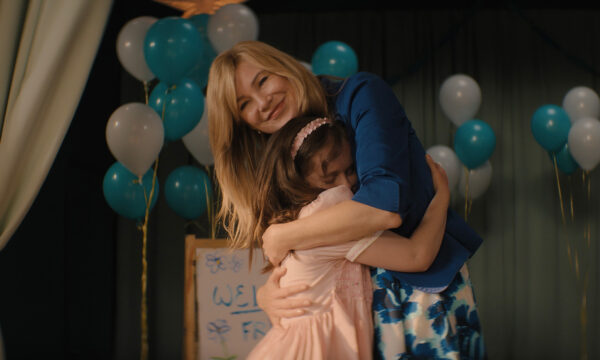
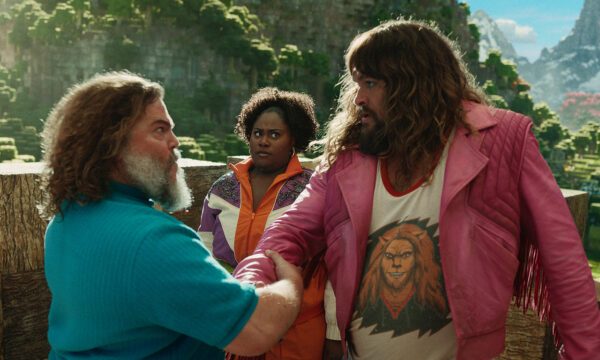
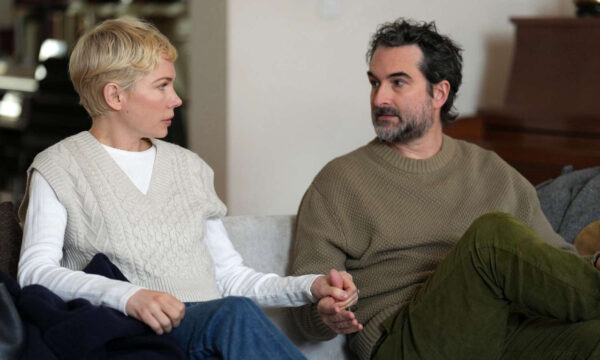
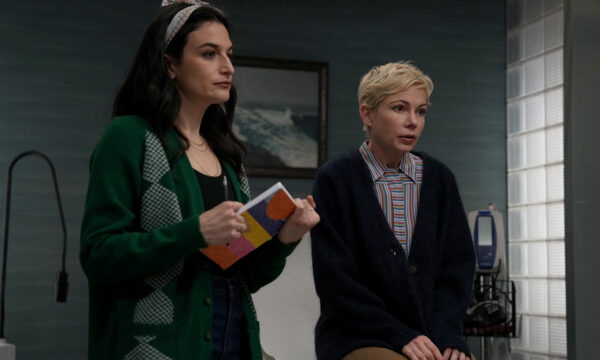


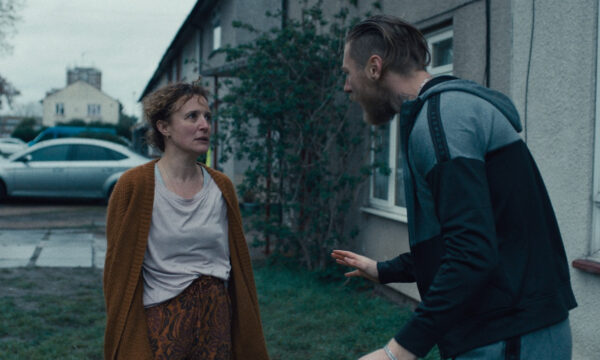









Facebook
Twitter
Instagram
YouTube
RSS